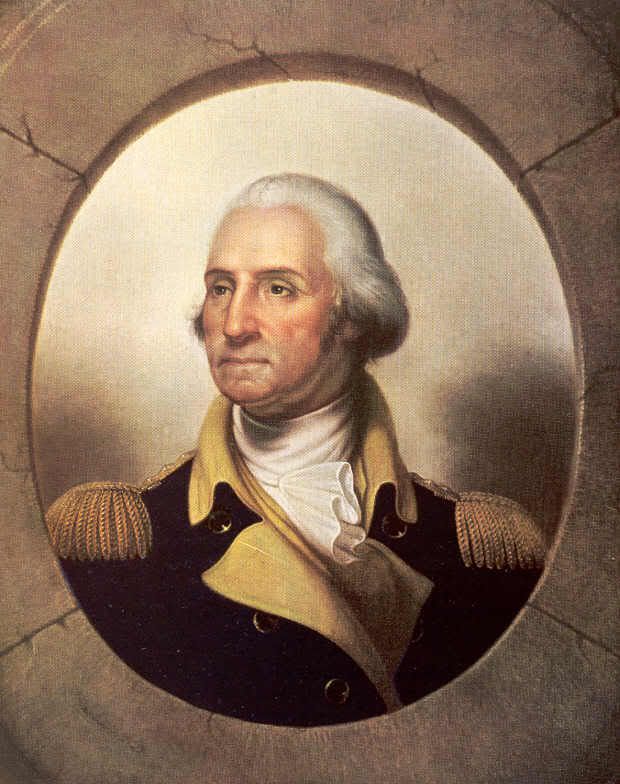First In the Hearts of His Countrymen?
 This was a persuasive essay I wrote for an academic planning class I took a while back. Even in academic planning class I have to turn it into a history assignment. I may be ill. I hope it persuades you.
This was a persuasive essay I wrote for an academic planning class I took a while back. Even in academic planning class I have to turn it into a history assignment. I may be ill. I hope it persuades you.A Gallup poll conducted in February of 2005 asked people who they thought the greatest U.S. President was. The results were surprising to say the least. Finishing at the top was Ronald Reagan, followed by Bill Clinton, Lincoln, FDR, and then JFK rounding out the top five. The current President placed sixth. Where did George Washington place? A disappointing seventh, barely ahead of Jimmy Carter! CSPAN did a survey of historians as to who the greatest President was and the results were quite different (American Presidents: Life Portraits n. pag.). Lincoln finished at the top, followed by FDR and then Washington; a far more reasonable ranking. What does this say about how we view history in this country? The Gallup poll indicates an “out of site, out of mind” attitude. Wartime Presidents not withstanding, the public favored more recent Presidents. But, how could our first President, the Founding Father, whose face we see everyday on our currency, have placed so low? Though his face in familiar, his accomplishments are not so, sadly. Despite the lack of familiarity and though he is often passed over for those in office during wartime, George Washington is our greatest President.
George Washington established the roll of the executive branch of the government. Prior to the government of the newly independent colonies, there had never been such an office as President. Though the duties of the President were outlined in the Constitution, how those duties were to be applied and to what affect was a matter of question. Washington left the powers of legislating to the legislators and, instead, concerned himself, as President, primarily with foreign affairs. He held firmly to the belief that the young nation should avoid entangling itself with foreign allegiances (The White House n. pag.).
Washington believed in a strong Federal government and was prepared to exercise the power and authority of the Federal government over the states in order to preserve the union. After Shay’s Rebellion in 1787 he believed that a new constitution would be needed that would allow a standing army to prevent such incidents (under the Articles of the Confederation, a standing army was prohibited) (Encyclopedia Britannica n. pag.). In 1794 he raised up 12,000 militia to quell an uprising in Pennsylvania over the collection of an excise tax on whiskey (National Park Service n. pag.). The “Whiskey Rebellion,” as it came to be known, was one of the first major crises that threatened the young nation and Washington’s decisive leadership was able to suppress it.
After his tremendous leadership as the commander of the Revolutionary Army, Washington’s popularity was fantastic. Many in the colonies, especially those in the army, wanted to make him King. Though it was his for the taking, he refused to accept it saying, “I didn’t fight George III to become George I.” (George F. Smith n. pag.).
In conclusion, George Washington was our greatest President because he defined the office, used the power of the Federal government to preserve the Union, and refused to be named King. He was a man of unquestionable character and leadership who held fast to his vision of a land that would be free. All of these things make George Washington our best and inexplicably overlooked President.
Works Cited
American Presidents: Life Portraits. “CSPAN Survey of Presidential Leadership.”
American Presidents.org. 26 March 2005 <http://www.americanpresidents.org/survey>
National Park Service. “The Whiskey Rebellion.” NPS.gov. 26 March 2005
<http://www.nps.gov/frhi/whiskreb.htm>
Smith, George F. “The Man Who Could Have Been King.”
freedom.orlingrabbe.com. 26 March 2005
The White House. “Biography of George Washington.” Whitehouse.gov. 26 March
2005 <http://www.whitehouse.gov/history/presidents/gw1.html>
“Washington, George.” Encyclopædia Britannica. 2005. Encyclopædia Britannica
Premium Service 26 March 2005 <http://www.britannica.com/eb/article?tocId=24513>


3 Comments:
Thank you for the post, and the history.
This is yet another quality post in a line, that I'm now beginning to expect out of the Halls of History.
Great, pressure. What have I done?
Ando --
1. Great post. We have thoroughly enjoyed studying George Washington each year we've done American History. One book that I found unique is called George Washington's World, by Genevieve Foster. The interesting thing is that it looks at world history throughout George's lifetime.
2. I have a GREAT idea for a new history post that I guarantee you will be WELL READ by many! I'll email you the details. :)
Post a Comment
<< Home